Money
Exact code reveals day your Pension Credit will be paid as 74,000 apply after Winter Fuel Payment change
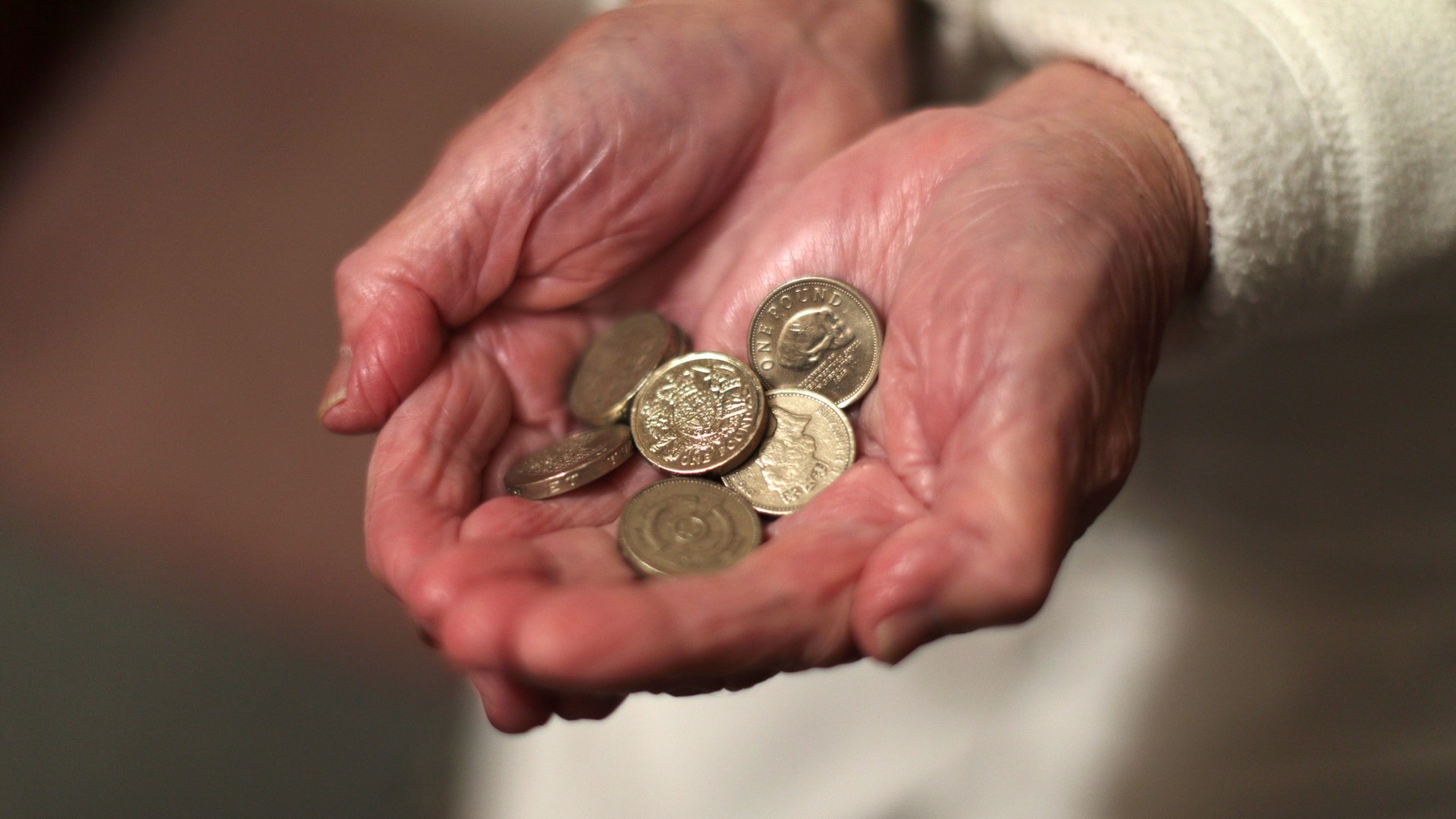
HOUSEHOLDS should be aware of the exact codes which reveal the day their Pension Credit will be paid into their account.
Pension Credit gives you extra money if you claim the State Pension and are on a low income.
Over one million retirees get the financial support, with the figure expected to rise as more households look to claim the benefit to get access to the Winter Fuel Payment.
That is because cuts made by Chancellor Rachel Reeves mean only those on means-tested benefits – which includes Pension Credit – get the £300 support.
Around 74,000 pensioners have applied for the benefit following the move.
If you are expecting to receive the benefit for the first time you should be aware that the money is paid in arrears on the last day of your benefit week.
What day you receive financial support depends on what benefit you have applied for and what date you first received the payment.
In this case, Pension Credit is paid every four weeks.
Usually, the day you receive the payment is allocated using the last two digits of your National Insurance number.
This code is made up of letters and numbers and never changes throughout your life.
If you are confused about where you can find your National Insurance number, it is usually on documents such as old payslips.
You can also check out this article here for a more detailed explanation of what to do if you can’t find your NI number.
Recipients then must look at the last two digits of this code to find out when they can expect to see their Pension Credit money paid into their account.
For example, if the last two digits of your NI number are between 00-19, your benefit week runs from Tuesday to Monday, with the Pension Credit payday being Monday.
If your NI number is between 20-39 then your benefit week runs from Wednesday to Tuesday, with your Pension Credit payday set to be Tuesday.
If your NI number is between 40-59, your benefit week runs from Thursday to Wednesday and your payday will be Wednesday.
Meanwhile, if your NI number is between 60-79, then your benefit week runs from Friday to Thursday and your payday will be Thursday.
Finally, if your NI is between 80-99, then your benefit week runs from Saturday to Friday and your Pension Credit payday will be Friday.
Caroline Abrahams CBE, charity director at AgeUK said a person’s payday doesn’t affect Pension Credit entitlement.
She explained: “We would urge anyone who is struggling right now to check whether they are entitled to extra money help.
“Age UK hosts a free and anonymous Benefits Calculator which can provide an estimate of the benefits that people could be entitled to so it’s worth checking.”
What can you get on pension credit?
If you live with a partner and you are both of State Pension age then your weekly income must fall below around £350.
However, if your income is slightly higher, you might still be eligible for Pension Credit if you have a disability, you care for someone, you have savings or you have housing costs.
You could get an extra £81.50 a week if you have a disability or claim any of the following:
- Attendance allowance
- The middle or highest rate from the care component of disability living allowance (DLA)
- The daily living component of personal independence payment (PIP)
- Armed forces independence payment
- The daily living component of adult disability payment (ADP) at the standard or enhanced rate.
You could get the “savings credit” part of pension credit if both of the following apply:
- You reached State Pension age before April 6, 2016
- You saved some money for retirement, for example, a personal or workplace pension
This part of Pension Credit is worth £17.01 for single people or £19.04 for couples.
Pension Credit opens the door to other support, including housing benefits, cost of living payments, council tax reductions and the Winter Fuel Payment.
Claims for Pension Credit also open doors to a number of freebies and discounts.
For example, Pension Credit claimants over 75 qualify for a free TV licence worth up to £169.50 a year.
Claims for the benefit also provide eligibility to £25 a week cold weather payments and the £150 warm home discount.
How to check your eligibility?
For those who are unsure if they can get access to the help, you can use the government’s Pension Credit Calculator.
This is available on the Gov.uk website and you have to put in your personal details to see if you qualify or not.
Before you begin the process you will need details of your earnings, benefits, pensions, savings and investments.
If you have a partner you must put in their details as well.
Applications for pension credit can also be made by ringing the pension credit claim line on 0800 99 1234.
You can get a friend or family member to ring for you, but you’ll need to be with them when they do.
You’ll need the following information about you and your partner if you have one:
- National Insurance number
- Information about any income, savings and investments you have
- Information about your income, savings and investments on the date you want to backdate your application to (usually three months ago or the date you reached state pension age)
If you claim after you reach pension age, you can backdate for up to three months.
Are you missing out on benefits?
YOU can use a benefits calculator to help check that you are not missing out on money you are entitled to
Charity Turn2Us’ benefits calculator works out what you could get.
Entitledto’s free calculator determines whether you qualify for various benefits, tax credit and Universal Credit.
MoneySavingExpert.com and charity StepChange both have benefits tools powered by Entitledto’s data.
You can use Policy in Practice’s calculator to determine which benefits you could receive and how much cash you’ll have left over each month after paying for housing costs.
Your exact entitlement will only be clear when you make a claim, but calculators can indicate what you might be eligible for.
Money
Harvester selling its biggest ever plate as fans hail whopping 3,769-calorie mountain of meat for £50
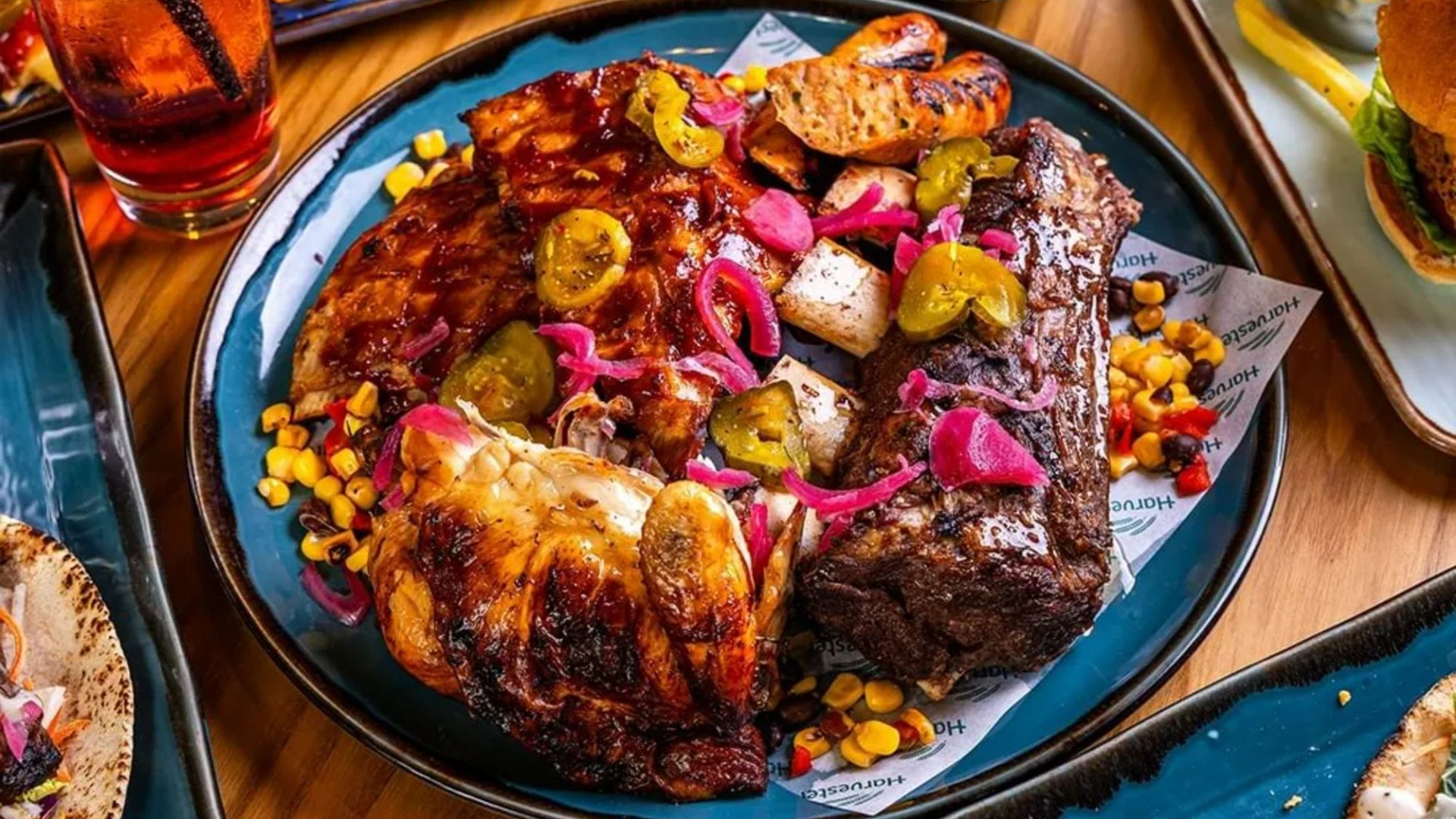
HARVESTER has launched its biggest plate of food yet – a gut-busting mountain of meat for £50.
The restaurant chain has added the enormous dish to its latest menu and it contains a whopping 3,769 calories.
Greedy diners can feast on half a rotisserie chicken, a half rack of BBQ ribs, a short of beef rib and a massive cheddar and jalapeño sausage.
The giant plate is finished with a heap of salsa, pink pickled onions, corn bread, chips and coleslaw.
If that’s not enough, food fans can still top it off with a bowl of Harvester’s famous self-service salad bar.
The Ultimate Rib Roundup is described as a ‘sharer’ dinner on the menu and comes with a price tag of £49.99.
Harvester, however, has told customers: “Perfectly grilled, packed with flavour and made for sharing (or keeping all to yourself).”
Brenda Gliddon visited her local branch in Kent with her grown-up son to try the Ultimate Rib Roundup.
She said: “My son can out eat anyone I know but even he left some.” Other Harvester fans have also been eyeing up the new calorific dish as a meal for one.
One wrote on the restaurant chain’s Facebook official page: “I love sharing but I’d rather keep this all to myself!”
Another added: “That’s a single portion!”
Tagging in a pal, third commented: “You’ve got to try this. You might get more than 4 ribs on your plate!”
The Ultimate Rib Roundup is available in all 165 UK branches of Harvester.
It has been added as a new addition to the eatery’s Grills and Combos section of the menu.
Listed as a ‘Supreme Flavour Fan Sharer’, the description reads: “A hearty feast for true grill lovers: half of our succulent rotisserie chicken, a half rack of BBQ glazed ribs, a tender short beef rib and a Cheddar & jalapeño sausage paired with charred corn & black bean salsa and pink pickled onions.
“Served with sage & onion seasoned chips, our new hot honey drizzled corn bread and hot slaw.”
How to save money eating out
THERE are a number of ways that you can save money when eating out. Here’s how:
Discount codes – Check sites like Sun Vouchers or VoucherCodes for any discount codes you can use to get money off your order.
Tastecard – This is a members club where you pay to have access to discounts worth up to 50 per cent off at thousands of restaurants. It costs £4.99 a month or £34.99 for the year.
Loyalty schemes – Some restaurants will reward you with discounts or a free meal if you register with their loyalty scheme, such as Nando’s where you can collect a stamp with every visit. Some chains like Pizza Express will send you discounts for special occasions, such as your birthday, if you sign up to their newsletter.
Voucher schemes – Look out for voucher schemes offered by third party firms, such as Meerkat Meals. If you compare and buy a product through CompareTheMarket.com then you’ll be rewarded with access to the discount scheme. You’ll get 2 for 1 meals at certain restaurants through Sunday to Thursday.
Student discounts – If you’re in full-time education or a member of the National Students Union then you may be able to get a discount of up to 15 per cent off the bill. It’s always worth asking before you place your order.
Money
Ultra-rare note error sparks eBay bidding war as £10 sells for 25 times its value – can you spot what’s wrong?
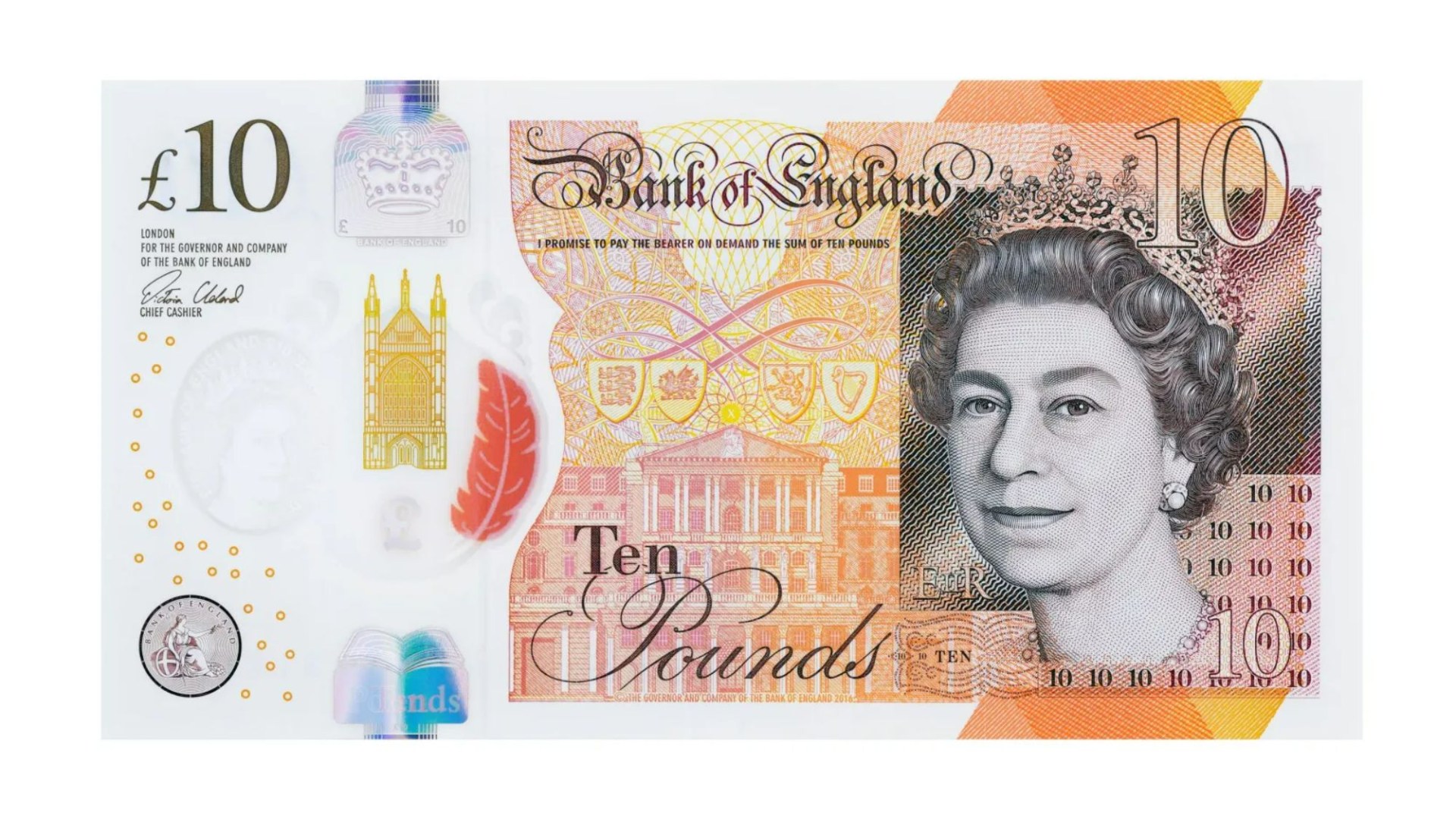
THIS ultra-rare £10 note triggered an intense eBay bidding war – and sold for a whopping £255 – but can you tell what’s wrong?
The note was advertised as having a “rare mint error” that’s related to its printing.
The £10 is certainly rare, sporting a completely blank side that left bidders baffled.
Sold in September, the tenner attracted a whopping 27 bids from those desperate to get their hands on the bizarre note.
The poster even manage to nab themselves an extra £12.95 just for delivery, all the way from Denmark.
A blank note of this kind is practically impossible to find elsewhere.
From our research, the only other £10 blank note we could find appeared to sell for £156.11 on eBay.
It comes as a rare 50p coin sold for 200 its usual value because it was missing a tiny “mark”.
The King Charles Atlantic Salmon 50p was advertised as having “no privy mark” on eBay.
It later sold for a whopping £102 following 23 bids from eager collectors.
A privy mark is a tiny crown symbol stamped onto some coins on the “heads” or “obverse” side – or on the rim.
In the case of the King Charles Atlantic Salmon 50p, first minted in 2023 in celebration of Charles‘ ascension of the throne, the privy mark is a small Tudor crown.
It can be spotted just behind the King’s head.
How to spot rare coins and banknotes
Rare coins and notes hiding down the back of your sofa could sell for hundreds of pounds.
If you are lucky enough to find a rare £10 note you might be able to sell it for multiple times its face value.
You can spot rare notes by keeping an eye out for the serial numbers.
These numbers can be found on the side with the Monarch’s face, just under the value £10 in the corner of the note.
Also if you have a serial number on your note that is quite quirky you could cash in thousands.
For example, one seller bagged £3,600 after spotting a specific serial number relating to the year Jane Austen was born on one of their notes.
You can check if your notes are worth anything on eBay, just tick “completed and sold items” and filter by the highest value.
It will give you an idea of what people are willing to pay for some notes.
But do bear in mind that yours is only worth what someone else is willing to pay for it.
This is also the case for coins, you can determine how rare your coin is by looking a the latest scarcity index.
The next step is to take a look at what has been recently sold on eBay.
Experts from Change Checker recommend looking at “sold listings” to be sure that the coin has sold for the specified amount rather than just been listed.
What are the most rare and valuable coins?
Money
I won £200k on People’s Postcode Lottery and lost half a stone – I’ve had sleepless nights & still think it’ll disappear

A WINNING Postcode Lottery player bagged an eye-watering £200,000 and lost half a stone.
Alison and Tim Browne, from Breaston, Derbyshire, were gobsmacked when they discovered the lucrative jackpot.
The couple were one of three households who scooped the windfall in the Postcode Lottery Millionaire Street draw last week.
Mum-of-two Alison said their jackpot has seen her drop half a stone within a week due to lack of sleep.
“But it’s good! You have dreams that you have won lots of money, but then you wake up and think, ‘Damn, it’s a dream’,” she said.
“This is how I felt every night this week when I managed to get to sleep at 3am. Then I woke up and thought, ‘No, it’s not a dream!’
“Never in my wildest dreams did I think we would win this much.”
Tim admitted he didn’t even enter the competition – but his wife unknowingly had.
He said: “I can’t believe it. I’m just glad she didn’t phone to tell me the amount when I was driving!
“I didn’t even know she was doing People’s Postcode Lottery, to be honest.”
An overjoyed Alison added: “It’s a fantastic feeling and I can’t stop smiling. But we’re going to have a big, big party on the street.
“It’s wonderful. We’ve known George and Paul for over 30 years and we get on really, really well.
“It’s a lovely street, lovely neighbours, and a lovely place to live.
“I don’t know what to think. This is life-changing, it really is.”
The pair are plan to splurge the cash on a lavish holiday to celebrate their 40th anniversary.
And, they will finally be able to tick riding on the iconic Orient Express off their bucket-list.
Tim said: “It means everything. We always wanted to do the train trip across the Rockies in Canada and also the Orient Express.
“There’s lots of trips that we’ve never done and have never been able to do. And now we’ll be able to do them and that’s fantastic.”
Alison, a freelance school music exam coordinator, said: “We’ve been married 43 years now, but our 40-year anniversary fell during lockdown so we weren’t able to celebrate properly. Now we can do that.”
The couple share a son Matthew, who is autistic, and hailed the win for “the security this will bring him”.
Meanwhile, older son James, joked: “I’ll be happy with a pint in Spoons. It’s £6 a pint!”
Tim revealed he also dreams of welcoming a new puppy into the family to keep Pointer Finlay company.
The musician told how a new Gore-Tex waterproof jacket wouldn’t go a miss either.
Alison laughed: “If we get another dog we’ll need a house with a bigger garden.
“My son and daughter-in-law don’t want us to get another dog because they have to look after them if we go away.
“We’re all going away to Wales on holiday together next week so we can celebrate there.”
It comes as another lucky player who scooped a life-changing Postcode Lottery prize refused to believe she had won – until a key sign revealed it was fate.
Meanwhile, another punter doubled their £200,000 Postcode Lottery win by using a clever trick – make sure you don’t miss out.
Jo Deighton from Shoreham, West Sussex, was gobsmacked when she scooped nearly an eye-watering quarter of a million pounds.
Elsewhere, one Brit who bagged a £410,000 jackpot told how no one believed her – not even her husband.
Leyla Eaton’s jaw dropped after discovering she’d scooped the eye-watering prize.
The mum-of-two entered when she was struck by a “strong feeling” a huge windfall was coming her way.
How to play the People’s Postcode Lottery?

For just £12 a month, players can sign up through the official website to have a chance of winning millions of pounds.
Once signed up, players are automatically entered into every draw and prizes are announced every day of each month.
Tickets play for the Daily Prize, worth £1000 and revealed every single day.
Tickets could also win a jackpot of £30,000 for Saturday and Sunday’s Street Prize draws.
People’s Postcode Lottery also offers a £3million Postcode Millions draw each month – where your ticket plays for a share of the cash prize fund.
Winners are notified by email, text, post, or phone call, depending on the prize they win.
Jackpot winners are visited by the lottery team in person.
Money
Nine Budget predictions that Rachel Reeves could make including pensions shake-up and alcohol price rises
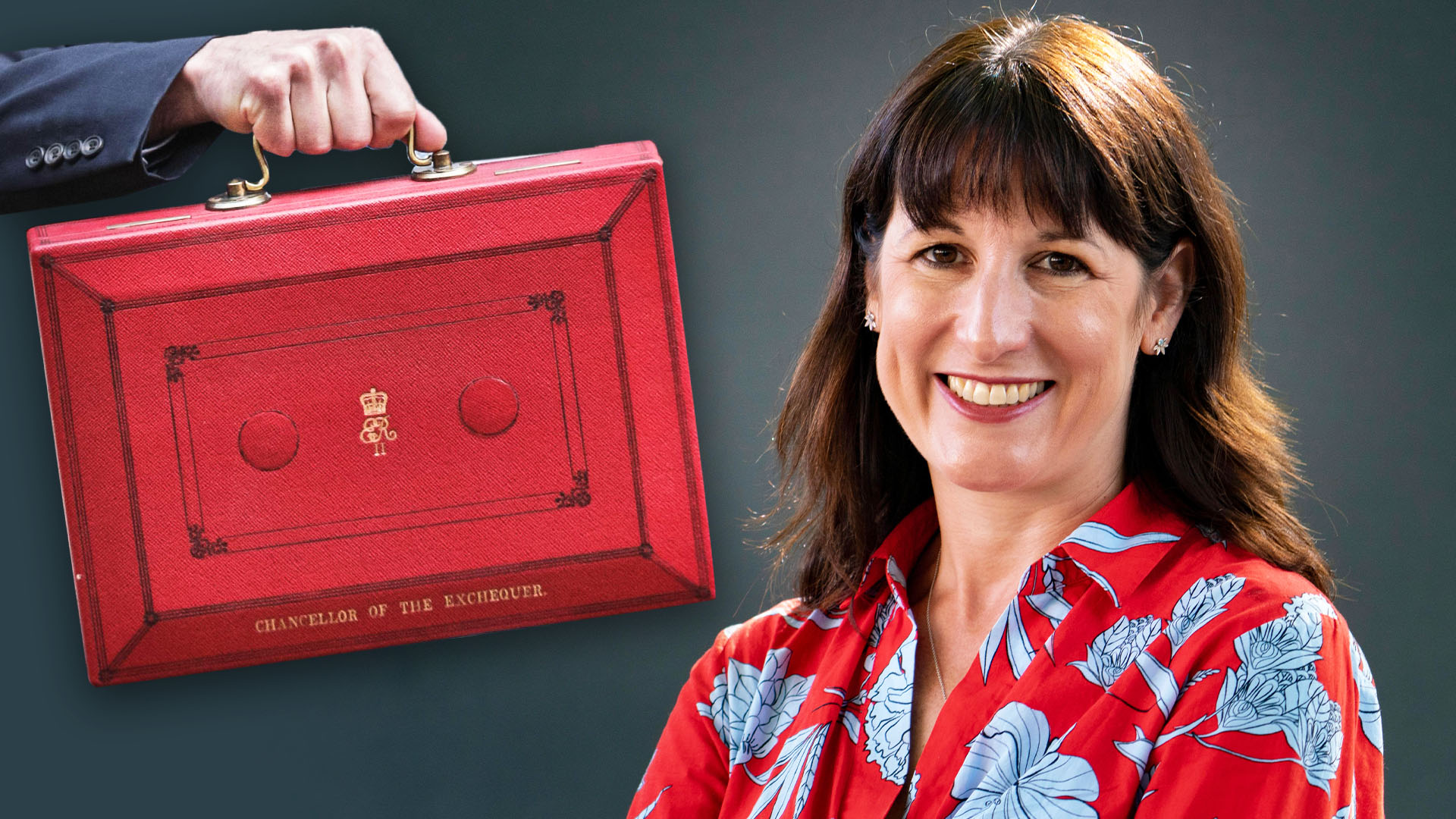
THERE’S less than a week to go until this year’s Budget, leaving many people wondering what the Government will announce.
The Budget gives an update on the government’s economic plans, which are based on official forecasts from the Office for Budget Responsibility (OBR).
It also gives Chancellor Rachel Reeves the chance to update Parliament on the government’s tax and spending plans for the next year.
Labour’s manifesto promise ruled out hikes to VAT, income tax rates and national insurance in line with its pledge to help “working people”.
The Government has so far refused to rule out several big tax changes, including a council tax reform and new pension rules.
Meanwhile, Sir Keir Starmer’s warning that the Labour Party’s first Budget in more than a decade “is going to be painful” has left many wondering what could be announced.
Here we take you through what could be in store.
Income tax
Experts suggest that Rachel Reeves could extend the “stealth” freeze on income tax thresholds for another two years.
The personal allowance, which is the amount that people can earn before they need to pay income tax, is frozen until 2028 but the Chancellor could extend it in next week’s Budget.
As worker’s wages rise in line with inflation this could drag thousands of people into higher tax brackets through fiscal drag.
Government sources have said that doing so would not breach Labour’s general election manifesto, which promised not to increase the rate of income tax.
The move could bring in as much as £7billion a year from 2028 onwards.
Capital gains tax
Another rumour is that Labour will make changes to capital gains tax in its Budget.
Capital gains tax is charged on the profit you make when you sell something that has increased in value.
Sir Keir Starmer has ruled out charging capital gains tax for first-time buyers, which is exempt under the current system.
Experts now predict that the rate charged for higher-rate taxpayers selling a second home will remain at 24%.
What is the Budget?
THE Budget is big news and where you’ll often hear announcements about taxes. But what exactly is it?
The Budget is when the Government outlines its plans for the economy including taxation and spending.
The Chancellor of the Exchequer delivers a speech in the House of Commons and announces plans for things like tax hikes, cuts and changes to Universal Credit and the minimum wage.
At the same time, the Office for Budget Responsibility (OBR) publishes an independent analysis of the UK economy.
Usually, the Budget is a once-a-year event and usually takes place in the Autumn, with a smaller update known as the Spring Statement.
But there have been exceptions in recent years when there have been more updates, or the announcements have taken place at different times, for example during the pandemic or when there is a General Election.
On the day of the Budget, usually a Wednesday, the Chancellor is photographed outside No 11 Downing Street with the red box.
She then heads to the House of Commons to deliver her speech, at around 12.30 following Prime Minister’s Questions (PMQs).
Changes announced in the Budget are sometimes implemented the same day, while others may not have a set date.
For example, a change to tobacco duty usually happens on the same day, pushing up the price of cigarettes.
Some tax changes are set to come in at the start of a new tax year, which is April 6.
Other changes may need to pass through Parliament before coming into law.
But the 20% tax when selling shares or other valuable assets such as paintings or furniture could be increased.
This move may not affect basic-rate taxpayers, who currently pay 10pc, although a change to their thresholds has not been ruled out.
The Government may also alter the current threshold at which capital gains tax is due.
At the moment the first £3,000 you make in profit for selling an item that has increased in value is tax-free.
But this threshold has been reduced several times by the previous Conservative government.
First from £12,300 in 2022-23, then to £6,000 in 2023-24.
Inheritance tax
The prime minister and chancellor could make multiple changes to inheritance tax, which currently has several exemptions and reliefs.
Inheritance tax is currently charged at 40% on the property, possessions and money of someone who has died if they are worth more than £325,000.
Fewer than one in 20 estates currently pays death duties as many estates fall below this threshold.
But the tax raises about £7 billion a year for the Government.
There are several exemptions and reliefs which mean you do not need to pay inheritance tax, including gifts or giving to charity.
It is thought that changes to several of these rules are being considered.
For example, gifts which are given less than seven years before you die may be taxed.
There are also exemptions if you leave land or pasture which is used to rear animals or to grow crops through agricultural relief.
It is not yet confirmed what changes will be made in the Budget on 30 October.
Employer national insurance contributions
Experts have suggested that the Chancellor could impose national insurance on employers’ pension contributions in the Budget.
Doing so could raise £15.4 billion, which would help to plug a £40billion funding gap in the public finances.
Employers currently pay national insurance for post workers earning more than £9,100 a year.
The amount they pay is equivalent to 13.8% of the employee’s earnings above this figure.
For an employee earning £30,000 the employer would pay around £2,884.20 in national insurance.
Former pensions minister Sir Steve Webb said that if the government put up the national insurance rate by 1% it could raise an extra £8 billion a year.
But he warns that it could leave millions of workers with lower wages and less generous pensions.
If an employer has to pay more tax then their costs will go up, so they would need to save money elsewhere.
They may do this by giving employees smaller pay rises or by reducing the amount that they pay into employees’ pensions.
Sir Steve said: “Changing national insurance contributions could leave hundreds of thousands of people with a poorer retirement.”
Pensions
The Government has so far failed to rule out changes to the lump sum you can take out of your pension without paying tax.
At the moment retirees can withdraw up to 25% of the total value of their pension tax-free, up to a maximum of £268,275.
But Labour is allegedly considering cutting the tax-free amount to £100,000 in a move which could raise around £2 billion.
It is not yet clear how this would work.
Another option being considered is to charge inheritance tax on pensions.
At present pensions are not considered to be part of your estate when you die, which means that you do not need to pay IHT on them.
But some suggest that Labour could change this in a move which could leave grieving families tens of thousands of pounds worse off.
What are the different types of pensions?
WE round-up the main types of pension and how they differ:
- Personal pension or self-invested personal pension (SIPP) – This is probably the most flexible type of pension as you can choose your own provider and how much you invest.
- Workplace pension – The Government has made it compulsory for employers to automatically enrol you in your workplace pension unless you opt out.
These so-called defined contribution (DC) pensions are usually chosen by your employer and you won’t be able to change it. Minimum contributions are 8%, with employees paying 5% (1% in tax relief) and employers contributing 3%. - Final salary pension – This is also a workplace pension but here, what you get in retirement is decided based on your salary, and you’ll be paid a set amount each year upon retiring. It’s often referred to as a gold-plated pension or a defined benefit (DB) pension. But they’re not typically offered by employers anymore.
- New state pension – This is what the state pays to those who reach state pension age after April 6 2016. The maximum payout is £203.85 a week and you’ll need 35 years of National Insurance contributions to get this. You also need at least ten years’ worth to qualify for anything at all.
- Basic state pension – If you reach the state pension age on or before April 2016, you’ll get the basic state pension. The full amount is £156.20 per week and you’ll need 30 years of National Insurance contributions to get this. If you have the basic state pension you may also get a top-up from what’s known as the additional or second state pension. Those who have built up National Insurance contributions under both the basic and new state pensions will get a combination of both schemes.
Stamp duty
Stamp duty land tax is due if you buy a property or a piece of land which is worth more than a certain price in England and Northern Ireland.
In 2022 the rate at which people start to pay it was increased from £125,000 to £250,000 for second-steppers.
Meanwhile, for first-time buyers, it rose from £300,000 to £450,000.
A discounted rate on property purchases of up to £625,000 was also introduced.
But these higher thresholds are only due to last until March 31 2025, after which point they will return to the original levels.
So far Labour has not committed to extending them.
If the higher thresholds are not extended then it could mean first-time buyers are slapped with tax bills which are £15,000 higher than before.
Cash ISAs
Savers have been rushing to open a cash ISA before 30 October to protect themselves from any tax surprises which could be announced in the Budget.
Cash ISAs are a tax-free way to save towards your financial future or invest in the stock market.
Every tax year you can save up to £20,000 in one account or split your allowance across multiple accounts.
The tax year runs from 6 April to 5 April.
You can only pay into one Lifetime ISA in a tax year and the maximum amount you can deposit is £4,000.
There is no limit on how much cash you can stash away over your lifetime.
Meanwhile, savers can be forced to pay tax on their nest eggs if they go over the personal savings allowance.
Basic-rate taxpayers can earn up to £1,000 in interest before they need to pay tax on their savings.
Higher-rate taxpayers can earn up to £500 in interest, while additional-rate taxpayers get no allowance.
But The Resolution Foundation, a think tank, has previously suggested that the government should slash the amount that can be saved into an ISA to £1,000.
They argue that by not having a cap the accounts mostly benefit those with lots of disposable income.
Alcohol duty
It has been reported that the Chancellor is considering increasing alcohol duties in the Budget.
Rachel Reeves has not ruled out pushing up the tax on spirits, beer and wine, which would raise an extra £800 million next year.
Alcohol duty is charged on all drinks which are more than 1.2% ABV strength, either at the point of production or when they are imported.
Usually, alcohol duty rises each year in line with inflation unless the Chancellor chooses to freeze it.
Although inflation is set to hit 2% next year, industry sources have said that alcohol duties could be pushed up to more than 6%.
But higher taxes could mean higher prices, which could deter drinkers and cause them to buy less.
Fuel duty
Drivers could be hit in the pocket if Labour decides to make changes to fuel duty in the Budget.
Fuel duty rates have been frozen since 2011-12.
It was cut by a further 5p in 2022 by the Conservatives in response to soaring fuel prices at the start of the war in Ukraine.
The RAC has predicted that the 5p cut could be scrapped, which could increase the cost of filling up a tank by an average of £3.30.
Do you have a money problem that needs sorting? Get in touch by emailing money-sm@news.co.uk.
Plus, you can join our Sun Money Chats and Tips Facebook group to share your tips and stories
Money
Major bank offering £50 payments to customers and you’d get cash before Christmas
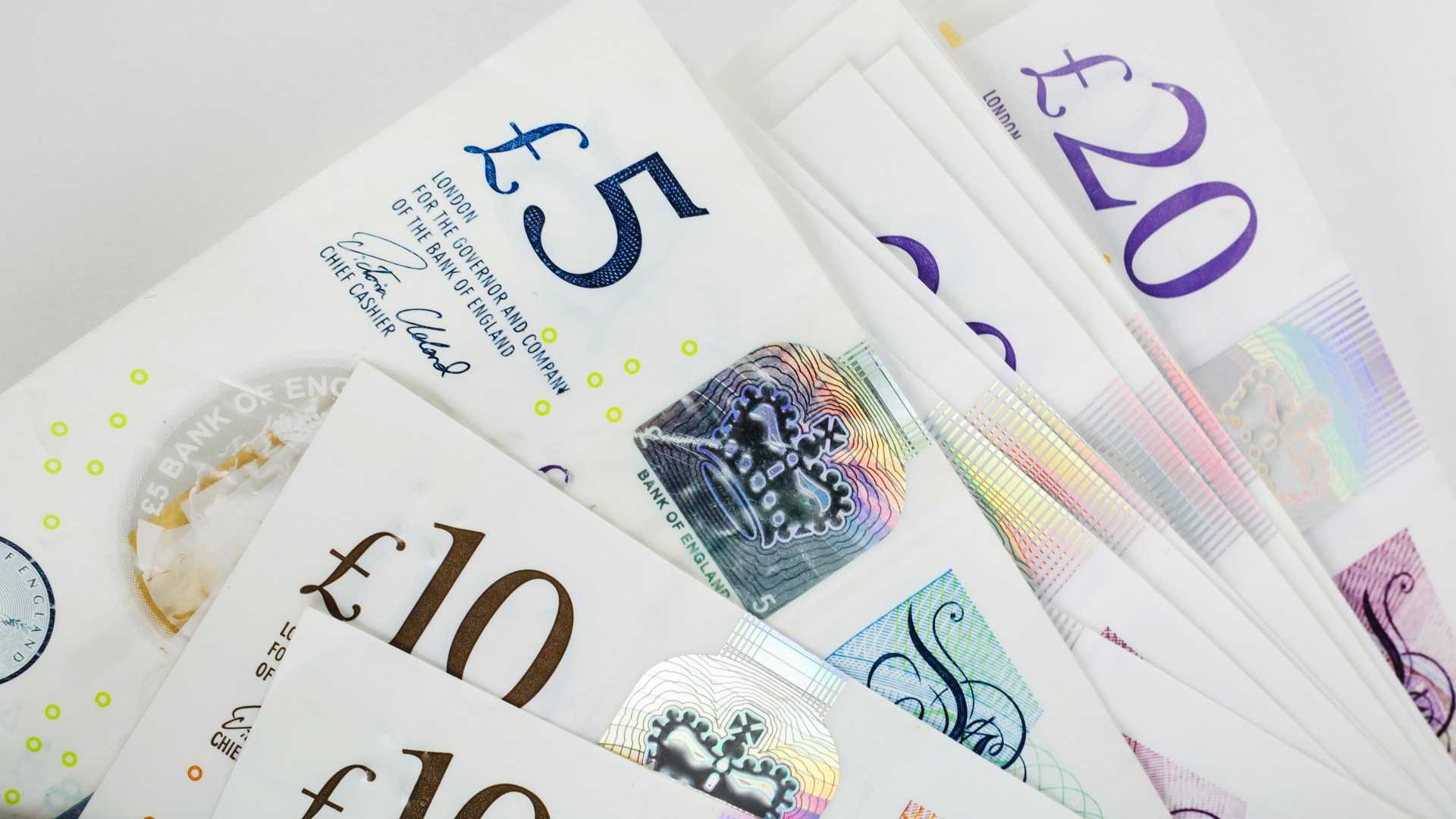
A HIGH street bank is giving away £50 free to customers who move their savings account to it from elsewhere.
The reward is available to any new or existing customer who switches their Individual Savings Account (Isa) from another provider to the bank.
An Isa is a a type of savings account where you don’t pay tax on any interest earned, and you can save up to £20,000 a year tax-free.
Smaller savings pots don’t usually incur tax, but larger ones can.
For those putting away money for big purchases, like a home deposit, an Isa is worth considering.
The offer from Santander could be withdrawn at any moment – so those eyeing up the extra cash for Christmas should act fast.
Now Santander is offering free cash to those with a nest egg of more than £10,000.
Once the transfer is complete the bank will give customers a £50 e-voucher.
This can be spent at more than 100 restaurants, supermarkets and clothes stores including Argos, B&M and Primark.
Banks often offer incentives to attract new customers, typically for bank accounts, but sometimes for other products like savings accounts too.
Andrew Hagger, personal finance expert at Moneycomms, said: “This is a good incentive – especially for people who may be sitting on some poor performing Isas.”
But it’s important to check that an account is right for you before you switch, instead of moving your money just to get an incentive, and that you’re getting the best rate on offer.
How do I get the deal?
First you need to apply for a Santander Fixed Rate Isa.
You can also upgrade an existing Santander Isa to a Fixed Rate Isa.
Once the account is opened, you must complete a transfer in instruction.
Santander suggests that you do this on the day you open your account or upgrade.
What is an Isa?
Isa stands for Individual Savings Account.
There are four types: cash Isas, stocks and shares Isas, lifetime Isas and innovative finance Isas.
The main benefit of an Isa is that all the money you pay in is tax-free.
This means that you do not need to pay tax on the amount you have saved or any interest you earn.
Every tax year you can save up to £20,000 in one Isa account or split your allowance across multiple accounts.
The tax year runs from April 6 to April 5.
You can open one with most banks and building societies.
Some providers will have restrictions on the minimum amount you can pay in and may require you to deposit a certain amount in order to open an account.
You can do this online or in a branch.
The instruction asks for your non-Santander Isa to be transferred to your new Fixed Rate Isa.
You need to do this within the first 14 days of opening your Isa account.
When you complete the form you will need to ask for a full transfer of your existing non-Santander account, which must have a balance of £10,000 or more.
You must provide an up-to-date email address which the bank can use to email you the code to redeem your e-voucher.
Your account could take up to 30 days to transfer.
You will be sent a code to redeem your e-voucher within 14 days of your transfer completing.
When transferring an ISA you must follow the bank’s correct processes, or you could lose the tax-free status of your cash.
Never withdraw your cash from the account.
Is the Santander deal worth it?
Santander currently has three fixed-rate Isas on offer, with different terms.
A fixed rate means you lock in the interest rate at the start and it won’t change in that time.
Locking away your cash can mean you’re protected if interest rates fall, but you could miss out if they rise.
SAVING ACCOUNT TYPES
THERE are four types of savings accounts fixed, notice, easy access, and regular savers.
Separately, there are ISAs or individual savings accounts which allow individuals to save up to £20,000 a year tax-free.
But we’ve rounded up the main types of conventional savings accounts below.
FIXED-RATE
A fixed-rate savings account or fixed-rate bond offers some of the highest interest rates but comes at the cost of being unable to withdraw your cash within the agreed term.
This means that your money is locked in, so even if interest rates increase you are unable to move your money and switch to a better account.
Some providers give the option to withdraw, but it comes with a hefty fee.
NOTICE
Notice accounts offer slightly lower rates in exchange for more flexibility when accessing your cash.
These accounts don’t lock your cash away for as long as a typical fixed bond account.
You’ll need to give advance notice to your bank – up to 180 days in some cases – before you can make a withdrawal or you’ll lose the interest.
EASY-ACCESS
An easy-access account does what it says on the tin and usually allows unlimited cash withdrawals.
These accounts tend to offer lower returns, but they are a good option if you want the freedom to move your money without being charged a penalty fee.
REGULAR SAVER
These accounts pay some of the best returns as long as you pay in a set amount each month.
You’ll usually need to hold a current account with providers to access the best rates.
However, if you have a lot of money to save, these accounts often come with monthly deposit limits.
You may be charged a penalty for withdrawing cash early, or lose the rate of interest, so if you need access to the cash a fix might not be for you.
You need £500 or more to open one of these accounts, though remember you’ll need to pay in £10,000 to get the bonus.
The one-year fixed-rate Isa gives you 4.01% interest on your nest egg.
If you transferred the minimum £10,000 this would give you a return of £33.42 a month, or £401 over the course of a year.
The 18 month fixed-rate Isa has a slightly lower return, at 3.91%.
On a £10,000 nest egg you would get £32.58 in interest each month, or £391 a year.
The two year fixed-rate Isa has the least generous interest rate of all of the accounts.
How does tax on savings work?
Isas and savings accounts have different rules on whether you need to pay tax on your savings.
All money paid into your Isa is tax-free, so you will never need to pay tax on your nest egg or any interest you earn on it.
But you may be charged interest on your savings depending on how much you have in your account.
All savers have a Personal Savings Allowance, which allows them to earn some interest on their savings tax free.
Any interest made above these allowances will incur a charge.
Basic rate taxpayers can earn up to £1,000 without paying tax.
For higher rate taxpayers this is set at £500.
Additional rate taxpayers do not have any allowance and so pay tax on all of their interest.
Once their allowance is exceeded, savers pay tax on their interest at their rate of income tax.
This would be 20 per cent for a basic rate taxpayer and 40 per cent for higher-rate taxpayers.
It has an interest rate of 3.81%, which would give you £31.75 a month, or £381 a year, on a £10,000 balance.
If you want to withdraw money from the account before its fixed-term has ended then you will need to close your account.
A charge equivalent to 120 days’ interest will be applied.
However there are Isas paying better rates of interest.
Virgin Money has the best one-year fixed-rate cash Isa of all banks and building societies.
It offers a return of 4.61% on your nest egg.
If you had £10,000 in savings this would give you £38.42 a month in interest – £5 more than the best Santander account.
Over the course of a year you would earn £461 in interest, £60 more than with the Santander account.
If you take into account the £50 bonus you would still be £10 better off after a year with the Virgin Money account.
Plus there is no minimum amount you need to open this account, which makes it a good option for savers with smaller pots.
Rachel Springall, finance expert at Moneyfactscompare.co.uk, said: “Savers need to be wary of cash sweeteners if the account itself does not offer the best value compared to other similar accounts.
“Santander’s rates are not market leading and there are a plentiful amount of challenger banks offering much higher rates.”
How do I compare rates?
You can find a full list of the best Isa accounts by using a comparison website such as Compare the Market and Moneyfactscompare.co.uk.
These will help you save you time and show you the best rates on offer.
You can also filter your searches by length or account type.
As a rule of thumb, you only want to consider an account that pays more interest than the current level of inflation, which is 1.7%.
It’s also worth checking regularly as rates can change from one day to the next.
It is a good idea to keep some money in an easy-access savings account which you can use in an emergency.
Once you have found an account you like you should contact the bank or building society you want to move to.
You will need to fill out an Isa transfer form to move your account.
Do not withdraw money from one account to pay into another as you will not be able to reinvest it as part of your tax-free allowance again.
It should not take longer than 15 working days to transfer money between cash Isas.
It can take up to 30 days for other types of transfer.
If your transfer takes longer than it should then contact your Isa provider.
Do you have a money problem that needs sorting? Get in touch by emailing money-sm@news.co.uk.
Plus, you can join our Sun Money Chats and Tips Facebook group to share your tips and stories
Money
High street fashion brand with 100 stores bought by owner of Hobbs, Whistles and Phase Eight

A MAJOR fashion brand with 100 UK branches has been bought out by a major fashion group.
White Stuff has been snapped up by The Foschini Group (TFG) in a deal believed to be worth around £50million.
TFG, a South-African fashion group, already owns fashion brands Hobbs, Whistles and Phase Eight.
White Stuff, which was founded in 1985, currently runs 113 stores and 46 concessions inside John Lewis and M&S branches.
No stores will close and no staff will be let go as part of the deal.
The retailer currently employs more than 1,200 people.
George Treves, co-founder of White Stuff, said: “Today marks a significant and emotional milestone for Sean and me.
“We have spent over 40 years building this company from the ground up.
“We have achieved more than we ever dreamed possible, thanks to the incredible dedication of our team, the support of our customers, and the commitment of our suppliers.”
It comes after the founders of White Stuff were said to be exploring a sale of the business earlier this year.
At the time it was understood no stores would be closing as part of any deal.
Last November, bosses also announced plans to open more shops, with several having opened since then.
In April this year, White Stuff reported record revenues of £154.8million, with 85% of revenue coming from online and store sales.
TFG said all colleagues across the business would keep their roles as part of the deal struck today, but that founders George Treves and Sean Thomas would step down.
The acquisition marks TFG’s expansion into the fashion retail market, having bought out Phase Eight in 2015, followed by Whistles then Hobbs.
Justin Hampshire, chief executive officer of TFG London, said: “We are thrilled to welcome the White Stuff team into the TFG London family.
“We have long admired the White Stuff brand which is synonymous with unique detail and exceptional quality.
“The addition of White Stuff to TFG London diversifies and strengthens our existing womenswear portfolio, adding the first lifestyle brand while also bringing a well-established menswear offer and its loyal and resilient customer base.”
He added that White Stuff would be looking to increase its number of stores and concessions across the UK.
White Stuff had been in advanced talks with TFG over a sale of the business for the last couple of days, Sky News reported.
A number of other parties were also believed to be interested in snapping up the retailer.
Today, Jo Jenkins, chief executive officer of White Stuff, said: “We have spent over 40 years building this company from the ground up.
“We have achieved more than we ever dreamed possible, thanks to the incredible dedication of our team, the support of our customers, and the commitment of our suppliers.
“Together, we have built something truly special.”
Companies that have been bought out
White Stuff is not the first company to have been bought out in recent years and months.
Carpetright was bought out by rival Tapi in a rescue deal in July this year, with 1,000 jobs cut and store closures announced.
CDS Superstores, trading as The Range and Wilko, also bought out Wilko’s website and some stores last year.
It came after Wilko collapsed into administration last year.
Do you have a money problem that needs sorting? Get in touch by emailing money-sm@news.co.uk.
Plus, you can join our Sun Money Chats and Tips Facebook group to share your tips and stories
-

 Science & Environment1 month ago
Science & Environment1 month agoHow to unsnarl a tangle of threads, according to physics
-

 Technology4 weeks ago
Technology4 weeks agoIs sharing your smartphone PIN part of a healthy relationship?
-

 Science & Environment1 month ago
Science & Environment1 month agoHyperelastic gel is one of the stretchiest materials known to science
-

 Science & Environment1 month ago
Science & Environment1 month ago‘Running of the bulls’ festival crowds move like charged particles
-

 Science & Environment1 month ago
Science & Environment1 month agoMaxwell’s demon charges quantum batteries inside of a quantum computer
-

 Technology1 month ago
Technology1 month agoWould-be reality TV contestants ‘not looking real’
-

 Science & Environment1 month ago
Science & Environment1 month agoX-rays reveal half-billion-year-old insect ancestor
-

 Science & Environment1 month ago
Science & Environment1 month agoSunlight-trapping device can generate temperatures over 1000°C
-

 Science & Environment1 month ago
Science & Environment1 month agoLiquid crystals could improve quantum communication devices
-

 Technology4 weeks ago
Technology4 weeks agoUkraine is using AI to manage the removal of Russian landmines
-

 TV3 weeks ago
TV3 weeks agoসারাদেশে দিনব্যাপী বৃষ্টির পূর্বাভাস; সমুদ্রবন্দরে ৩ নম্বর সংকেত | Weather Today | Jamuna TV
-

 Science & Environment1 month ago
Science & Environment1 month agoQuantum ‘supersolid’ matter stirred using magnets
-

 News3 weeks ago
News3 weeks agoMassive blasts in Beirut after renewed Israeli air strikes
-

 Technology3 weeks ago
Technology3 weeks agoSamsung Passkeys will work with Samsung’s smart home devices
-

 Football3 weeks ago
Football3 weeks agoRangers & Celtic ready for first SWPL derby showdown
-

 News3 weeks ago
News3 weeks agoNavigating the News Void: Opportunities for Revitalization
-

 Science & Environment1 month ago
Science & Environment1 month agoLaser helps turn an electron into a coil of mass and charge
-

 Science & Environment1 month ago
Science & Environment1 month agoA new kind of experiment at the Large Hadron Collider could unravel quantum reality
-

 Womens Workouts1 month ago
Womens Workouts1 month ago3 Day Full Body Women’s Dumbbell Only Workout
-

 News3 weeks ago
News3 weeks ago▶ Hamas Spent $1B on Tunnels Instead of Investing in a Future for Gaza’s People
-

 Business3 weeks ago
Business3 weeks agoWhen to tip and when not to tip
-

 Sport3 weeks ago
Sport3 weeks agoBoxing: World champion Nick Ball set for Liverpool homecoming against Ronny Rios
-

 MMA3 weeks ago
MMA3 weeks ago‘Uncrowned queen’ Kayla Harrison tastes blood, wants UFC title run
-

 Science & Environment1 month ago
Science & Environment1 month agoPhysicists have worked out how to melt any material
-

 Science & Environment1 month ago
Science & Environment1 month agoWhy this is a golden age for life to thrive across the universe
-

 Science & Environment1 month ago
Science & Environment1 month agoQuantum forces used to automatically assemble tiny device
-

 Technology4 weeks ago
Technology4 weeks agoMicrophone made of atom-thick graphene could be used in smartphones
-

 MMA3 weeks ago
MMA3 weeks agoPereira vs. Rountree prediction: Champ chases legend status
-

 News3 weeks ago
News3 weeks ago‘Blacks for Trump’ and Pennsylvania progressives play for undecided voters
-

 Sport3 weeks ago
Sport3 weeks agoMan City ask for Premier League season to be DELAYED as Pep Guardiola escalates fixture pile-up row
-

 MMA3 weeks ago
MMA3 weeks agoDana White’s Contender Series 74 recap, analysis, winner grades
-
Business3 weeks ago
DoJ accuses Donald Trump of ‘private criminal effort’ to overturn 2020 election
-

 Technology3 weeks ago
Technology3 weeks agoThis AI video generator can melt, crush, blow up, or turn anything into cake
-

 Football3 weeks ago
Football3 weeks agoWhy does Prince William support Aston Villa?
-

 Sport3 weeks ago
Sport3 weeks agoWales fall to second loss of WXV against Italy
-

 News1 month ago
News1 month ago▶️ Hamas in the West Bank: Rising Support and Deadly Attacks You Might Not Know About
-

 Technology1 month ago
Technology1 month agoMeta has a major opportunity to win the AI hardware race
-

 Technology4 weeks ago
Technology4 weeks agoRussia is building ground-based kamikaze robots out of old hoverboards
-

 Science & Environment1 month ago
Science & Environment1 month agoITER: Is the world’s biggest fusion experiment dead after new delay to 2035?
-

 Science & Environment1 month ago
Science & Environment1 month agoA slight curve helps rocks make the biggest splash
-

 Science & Environment1 month ago
Science & Environment1 month agoNerve fibres in the brain could generate quantum entanglement
-

 Science & Environment1 month ago
Science & Environment1 month agoNuclear fusion experiment overcomes two key operating hurdles
-

 MMA3 weeks ago
MMA3 weeks agoJulianna Peña trashes Raquel Pennington’s behavior as champ
-

 Sport3 weeks ago
Sport3 weeks agoAaron Ramsdale: Southampton goalkeeper left Arsenal for more game time
-

 Technology3 weeks ago
Technology3 weeks agoGmail gets redesigned summary cards with more data & features
-

 Technology3 weeks ago
Technology3 weeks agoMusk faces SEC questions over X takeover
-

 Science & Environment1 month ago
Science & Environment1 month agoHow to wrap your mind around the real multiverse
-

 Science & Environment1 month ago
Science & Environment1 month agoTime travel sci-fi novel is a rip-roaringly good thought experiment
-

 Technology1 month ago
Technology1 month agoWhy Machines Learn: A clever primer makes sense of what makes AI possible
-

 Technology3 weeks ago
Technology3 weeks agoMicrosoft just dropped Drasi, and it could change how we handle big data
-

 Sport3 weeks ago
Sport3 weeks agoSturm Graz: How Austrians ended Red Bull’s title dominance
-

 News3 weeks ago
News3 weeks agoFamily plans to honor hurricane victim using logs from fallen tree that killed him
-

 Entertainment3 weeks ago
Entertainment3 weeks agoNew documentary explores actor Christopher Reeve’s life and legacy
-

 Sport3 weeks ago
Sport3 weeks agoChina Open: Carlos Alcaraz recovers to beat Jannik Sinner in dramatic final
-

 Money3 weeks ago
Money3 weeks agoWetherspoons issues update on closures – see the full list of five still at risk and 26 gone for good
-

 Technology3 weeks ago
Technology3 weeks agoThe best budget robot vacuums for 2024
-

 MMA3 weeks ago
MMA3 weeks agoKetlen Vieira vs. Kayla Harrison pick, start time, odds: UFC 307
-

 News1 month ago
News1 month ago▶️ Media Bias: How They Spin Attack on Hezbollah and Ignore the Reality
-

 News3 weeks ago
News3 weeks agoWoman who died of cancer ‘was misdiagnosed on phone call with GP’
-
Business3 weeks ago
Sterling slides after Bailey says BoE could be ‘a bit more aggressive’ on rates
-
Business3 weeks ago
The search for Japan’s ‘lost’ art
-

 Business3 weeks ago
Business3 weeks agoStark difference in UK and Ireland’s budgets
-

 MMA3 weeks ago
MMA3 weeks agoPereira vs. Rountree preview show live stream
-

 Sport3 weeks ago
Sport3 weeks ago2024 ICC Women’s T20 World Cup: Pakistan beat Sri Lanka
-

 Sport3 weeks ago
Sport3 weeks agoCoco Gauff stages superb comeback to reach China Open final
-

 Sport4 weeks ago
Sport4 weeks agoWorld’s sexiest referee Claudia Romani shows off incredible figure in animal print bikini on South Beach
-

 Technology3 weeks ago
Technology3 weeks agoEpic Games CEO Tim Sweeney renews blast at ‘gatekeeper’ platform owners
-
Business3 weeks ago
Bank of England warns of ‘future stress’ from hedge fund bets against US Treasuries
-

 Science & Environment3 weeks ago
Science & Environment3 weeks agoMarkets watch for dangers of further escalation
-

 Business3 weeks ago
Business3 weeks agoChancellor Rachel Reeves says she needs to raise £20bn. How might she do it?
-

 Technology3 weeks ago
Technology3 weeks agoTexas is suing TikTok for allegedly violating its new child privacy law
-

 Technology3 weeks ago
Technology3 weeks agoOpenAI secured more billions, but there’s still capital left for other startups
-

 Technology3 weeks ago
Technology3 weeks agoThe best shows on Max (formerly HBO Max) right now
-

 MMA3 weeks ago
MMA3 weeks agoAlex Pereira faces ‘trap game’ vs. Khalil Rountree
-

 Football3 weeks ago
Football3 weeks agoSimo Valakari: New St Johnstone boss says Scotland special in his heart
-

 Technology3 weeks ago
Technology3 weeks agoJ.B. Hunt and UP.Labs launch venture lab to build logistics startups
-

 News3 weeks ago
News3 weeks agoGerman Car Company Declares Bankruptcy – 200 Employees Lose Their Jobs
-

 MMA3 weeks ago
MMA3 weeks agoUFC 307 preview show: Will Alex Pereira’s wild ride continue, or does Khalil Rountree shock the world?
-

 MMA3 weeks ago
MMA3 weeks ago‘I was fighting on automatic pilot’ at UFC 306
-
News1 month ago
the pick of new debut fiction
-

 News1 month ago
News1 month agoOur millionaire neighbour blocks us from using public footpath & screams at us in street.. it’s like living in a WARZONE – WordupNews
-

 News3 weeks ago
News3 weeks agoLiverpool secure win over Bologna on a night that shows this format might work
-

 News3 weeks ago
News3 weeks agoHull KR 10-8 Warrington Wolves – Robins reach first Super League Grand Final
-
Business3 weeks ago
Head of UK Competition Appeal Tribunal to step down after rebuke for serious misconduct
-

 Money3 weeks ago
Money3 weeks agoPub selling Britain’s ‘CHEAPEST’ pints for just £2.60 – but you’ll have to follow super-strict rules to get in
-

 News3 weeks ago
News3 weeks agoBalancing India and China Is the Challenge for Sri Lanka’s Dissanayake
-

 News3 weeks ago
News3 weeks agoHeavy strikes shake Beirut as Israel expands Lebanon campaign
-

 TV3 weeks ago
TV3 weeks agoLove Island star sparks feud rumours as one Islander is missing from glam girls’ night
-

 TV3 weeks ago
TV3 weeks agoPhillip Schofield accidentally sets his camp on FIRE after using emergency radio to Channel 5 crew
-

 News3 weeks ago
News3 weeks agoHeartbreaking end to search as body of influencer, 27, found after yacht party shipwreck on ‘Devil’s Throat’ coastline
-
Politics3 weeks ago
Rosie Duffield’s savage departure raises difficult questions for Keir Starmer. He’d be foolish to ignore them | Gaby Hinsliff
-

 Technology3 weeks ago
Technology3 weeks agoPopular financial newsletter claims Roblox enables child sexual abuse
-

 Health & fitness3 weeks ago
Health & fitness3 weeks agoNHS surgeon who couldn’t find his scalpel cut patient’s chest open with the penknife he used to slice up his lunch
-

 Technology3 weeks ago
Technology3 weeks agoIf you’ve ever considered smart glasses, this Amazon deal is for you
-

 Technology3 weeks ago
Technology3 weeks agoAmazon’s Ring just doubled the price of its alarm monitoring service for grandfathered customers
-

 Technology3 weeks ago
Technology3 weeks agoApple iPhone 16 Plus vs Samsung Galaxy S24+
-

 TV3 weeks ago
TV3 weeks agoMaayavi (මායාවී) | Episode 23 | 02nd October 2024 | Sirasa TV
-

 Technology3 weeks ago
Technology3 weeks agoHow to disable Google Assistant on your Pixel Watch 3
-

 News3 weeks ago
News3 weeks agoReach CEO Jim Mullen: If government advertises with us, we’ll employ more reporters
-

 News3 weeks ago
News3 weeks agoSpongerla Rayner’s gift gluttony is worse than Free Gear Keir’s – her freeloading has destroyed working class reputation













You must be logged in to post a comment Login